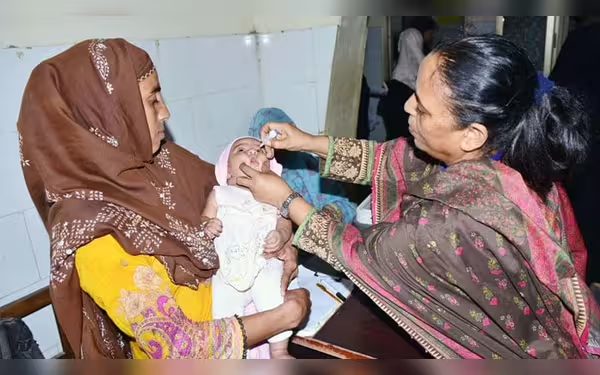Saturday, September 28, 2024 09:23 PM
Polio Case Reported in Darra Adamkhel, KP's Second in 2023
- 10-month-old girl diagnosed with polio in KP
- Pakistan reports 23 polio cases this year
- Urgent vaccination efforts needed to combat outbreak
 Image Credits: geo
Image Credits: geoA 10-month-old girl in Darra Adamkhel is paralyzed by polio, marking KP's second case in 2023 amid rising national concerns.
Polio, a highly infectious viral disease, has once again raised alarm bells in Pakistan, particularly in Khyber Pakhtunkhwa (KP). The recent diagnosis of a 10-month-old baby girl from Tehsil Darra Adamkhel with wild poliovirus type 1 (WPV1) has brought the total number of polio cases in the country to 23 this year. This unfortunate incident marks the second case reported in KP for 2023, following the confirmation of the first case in Mohmand district just days earlier.
The baby girl, who was diagnosed on September 12, has been left paralysed due to the virus. This situation is particularly concerning as KP had been polio-free until earlier this month, thanks to the relentless efforts of the provincial government, polio workers, and various national and international organizations dedicated to eradicating this disease. The focus of these efforts has been on the southern districts of KP, including Kohat, Bannu, and Dera Ismail Khan, among others.
In a broader context, the recent surge in polio cases has raised questions about the effectiveness of the country’s vaccination campaigns. Balochistan, for instance, has reported 15 cases, making it the epicenter of the current outbreak, while Sindh has recorded four cases. Punjab and Islamabad have each reported one case, highlighting the widespread nature of the threat.
Health officials from the Polio Eradication Initiative (PEI) have confirmed the presence of WPV1 in the latest case from Kohat, emphasizing the need for urgent action to close immunity gaps in vulnerable areas. Muhammad Anwarul Haq, the national coordinator for the Polio Emergency Operations Centre, has stressed that “every missed vaccination is an opportunity for the virus to win.” This statement underscores the critical importance of timely and repeated vaccinations for all children.
In response to the rising number of cases, Pakistan’s polio eradication programme has launched an anti-polio campaign this month, targeting 115 districts and aiming to vaccinate 33 million children under the age of five. However, the campaign faces significant challenges, including insecurity, misinformation, and parental refusals, which hinder vaccination efforts.
Ayesha Raza Farooq, the prime minister's focal person for polio eradication, has expressed frustration over the lack of progress, stating, “Each new case is a heartbreaking reminder that we are failing our children.” She emphasizes that the solution is straightforward: ensuring timely and repeated vaccinations.
The ongoing polio emergency remains a national priority, with health officials urging communities to cooperate and support vaccination efforts. It is crucial for parents to understand their role in protecting their children from this crippling disease. By ensuring that every child receives the necessary vaccinations, we can work together to eradicate polio from Pakistan once and for all. The fight against polio is not just a government responsibility; it is a collective effort that requires the commitment of every individual in society.













